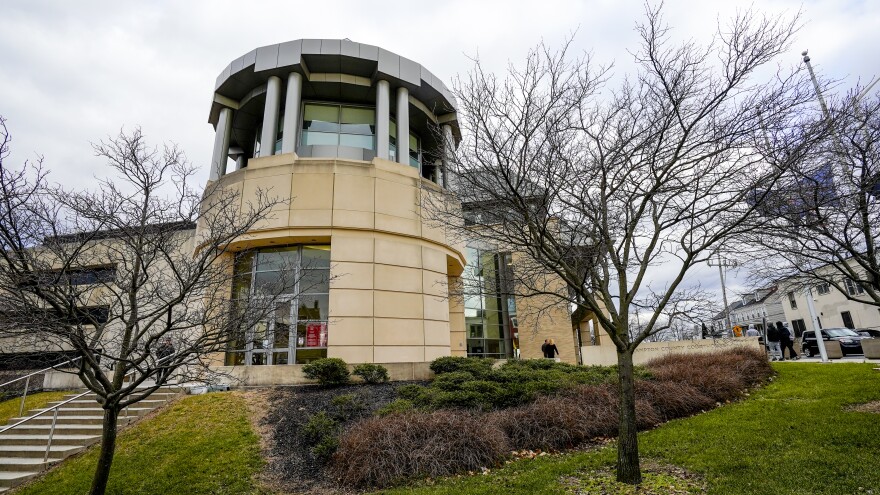EASTON, Pa. — Wracked with emotion, the father of former state champion wrestler Michael "Mikey" Racciato walked jurors through a timeline of his son's death Tuesday, in the first day of witness testimony in the trial of Christopher Ferrante.
Ferrante, 43, of Macungie, is charged with providing the drugs that killed 26-year-old Mikey Racciato on Christmas Day in 2020, along with two counts each of drug possession with the intent to deliver, simple possession and criminal use of a communication facility.
- Christopher Ferrante is accused of providing the drugs that killed 26-year-old Michael "Mikey" Racciato
- In tearful testimony, father Phil Racciato recounted his son's addiction and the events leading up to his December 2020 death
- Ferrante, 43, of Macungie, faces the possibility of decades in prison if convicted of all charges
On trial in Northampton County Court, Ferrante could face up to 86 years in prison if found guilty on all seven counts.
Racciato, a 2013 graduate of Pen Argyl Area High School, was a standout athlete and three-time PIAA state wrestling champion. He wrestled collegiately at the University of Pittsburgh.
Racciato's father, Phil Racciato, recounted how his son moved back to Pittsburgh in 2018 for a job after graduating from Pitt, before separating with his girlfriend, living with friends and eventually residing in an investment property purchased by his parents.
Phil Racciato said he began noticing money missing from his son's accounts in October 2019, before getting a call in the middle of the night in December 2019 in which Mikey was "out of control," he said. That prompted the father to make the five-hour overnight trip to Pittsburgh where he said he found Mikey sleeping with drug paraphernalia, including needles and plastic bags next to his bed.
Phil Racciato said his son entered and left rehab within days multiple times, and suffered multiple overdoses and relapses after coming home to the Lehigh Valley after his drug dependence was discovered.
He said he monitored Mikey's car travel and payments, and said he believed Mikey was "making strides."
Relapses challenged family
Phil Racciato said he noticed Mikey getting high again, in August 2020, as well as noticing a digital payment to a Christopher Ferrante. The father testified he made contact with Ferrante to tell him to "get away from my son."
Phil Racciato said that from November into December, he noticed more payments to Ferrante as Mikey's addiction deepened. He said Mikey came home from a trip to Ocean City, Maryland, on Dec. 21 clearly "on something."
"I've never seen him act like this," Phil Racciato testified, tears streaming down his face.
He said Mikey was yelling, beating his chest, saying "I'm a winner — I don't lose, I'm going to beat this," as Phil captured a video of his son's actions before EMS and police come and took him to a St. Luke's University Hospital. He said Mikey was pleading, saying he wanted to beat the addiction.
From St. Luke's he was transferred to Eagleville Hospital in Montgomery County, which he left 72 hours later, on Christmas Eve, Phil said.
Later that day, Mikey's parents allowed him to use the car to get Christmas gifts from Walmart, only to get a call about two hours later that Mikey had passed out inside the store after overdosing on Xanax, the father testified.
"That's a total lie. He has never expressed suicidal tendencies."Phil Racciato, father of Michael "Mikey" Racciato, under cross-examination
Later at the hospital, Phil said, he grabbed Mikey's phone, called Ferrante and ordered him to stay away for what he estimated was the third or fourth time. Phil left the hospital and told Mikey to call him when he was ready to be released.
But prosecutors reportedly said Ferrante later picked Mikey up at the hospital and dropped him off at his car at the Walmart.
Phil testified when he hadn't heard from Mikey at the hospital, he drove to where the car was parked — his parents had a tracking device on the vehicle — in a hotel parking lot not far from the Walmart in Lower Nazareth Township.
In tears, Phil Racciato described how he found Mikey slouched over in the front seat, with a needle still in his arm.
"I take it out...I wanted to hug my son," Racciato said. "It's Christmas Day."
Phil Racciato said he had tried to do "the most responsible job I could," and testified that he told police arriving on the scene that Ferrante was responsible for Mikey's death. He said he did not intend to tamper with crime scene evidence by throwing away the needle and a plastic bag found in the car at the time, which fell into a nearby drainage grate.
The Racciato family has since created the Mikey L. Racciato Foundation in his name to support services for children with special needs.

Cross-examination
In his cross-examination, defense attorney Gary Asteak argued that Mikey's death was a result of factors other than Ferrante, such as his potential suicidal intent cited in a report from Eagleville Hospital.
"That's a total lie," Phil Racciato said under questioning. "He has never expressed suicidal tendencies."
The prosecution countered that Mikey's discharge prognosis was positive, and the suicidal intent referenced in the report was related to Mikey's anger at relapsing.
The defense also questioned whether Mikey's death might have been influenced by the crossing of drugs in his system after his hospital stay, such as Benadryl, Xylazine, methadone or Hydroxyzine.
Dr. Robert Middleburg, of Horsham-based NMS Labs, testified that Racciato had a significant amount of fentanyl in his system.
"Is it a concentration we see with deaths? Yes," he said, but also acknowledged people with a high tolerance may survive that amount.
According to testimony, significant amounts of fentanyl were found both in drug samples Racciato possessed at the time of his death, as well as in his blood. Xylazine, a veterinary sedative, was also found in Racciato's system.
A digital forensic analysis of both Mikey Racciato's and Ferrante's phones found they had communicated in the time leading up to Racciato's death.
Northampton County Judge John Morganelli is presiding over the trial, which continues Wednesday.
On Tuesday, a juror was replaced with an alternate over lack of consistent transportation to the trial, over Asteak's objections.
No further discussion occurred Tuesday regarding the defense revelation that Ferrante had worked as an informant for the Allentown Police Department, and bought drugs at their behest twice in the weeks before Racciato’s death.
The case took on political importance for District Attorney Terry Houck in advance of the primary election in May. Stephen Baratta, a former judge who ultimately defeated Houck in the Democratic primary, forcefully criticized how prosecutors handled Ferrante’s prosecution.
The Pennsylvania Superior Court ruled in April that Morganelli did not abuse his authority when he refused to delay the Ferrante trial.


